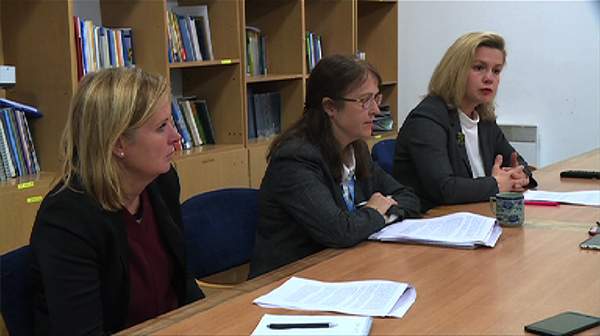 While Bhutan has made commendable achievements in terms of right to liberty in places of deprivation of liberty such as the detention centres and prisons, there are areas the country need to step up efforts to protect defendants’ rights.
While Bhutan has made commendable achievements in terms of right to liberty in places of deprivation of liberty such as the detention centres and prisons, there are areas the country need to step up efforts to protect defendants’ rights.
This is what a team from the United Nation’s Human Rights Special Procedures said.
The group visited places of deprivation in the country and commended the country’s achievements and also made several recommendations to the government to further safeguards of the defendants.
The team had visited 20 places of deprivation of liberty in Thimphu, Chhukkha, Paro, Punakha and Samtse and presented their findings yesterday at a press conference.
The team said the country needs to step up efforts to improve safeguards of the detainees. The working group identified three areas that Bhutan need to prioritize.
The group recommended looking into the current practice of detaining people in connection to civil cases, especially because of their inability to repay a debt or loan.
Instead of detention, the team said the country should come up with other alternatives.
Leigh Toomey is the Vice-Chair on Follow Up, Working Group on Arbitrary Detention of the UN.
“We came across and are aware that a large number of detainees are currently being held because they haven’t been able to comply with commercial agreement, in other words, to pay loan back or to pay a debt. In some cases, we found that the period of detention for these people was quite extensive, particularly in Thimphu and in Paro,” Leigh Toomey said.
“Under international law, it is not permitted and is considered an example of arbitrator detention. We would also recommend that alternatives be put in place. It’s the view of the working group that there are effective alternatives to imprisonment for debt. For example, flexible repayment schedule or allowing the debtor to actually work on the debt rather than being detained.”
The group also recommended the government to establish legal aid system with whatever resources available at their disposal. The group found the people were not aware of their right to legal representation or could not afford to pay even if they were aware of it.
“We understand that, as in every country, legal aid and legal representation is costly but we would urge the government to look at a range of things, such as private lawyers providing pro bono service as a condition of their obtaining a practicing certificate and perhaps making greater use of the new students who are being trained at law schools in a clinical legal setting to provide basic legal advice to detainees who would otherwise have no lawyer,” Leigh Toomey said.
The group also recommends detention centres to provide better facilities for detainees during pre-trials. “We would urge the government to prioritize pre-trial detention of adults,” Leigh Toomey said.
“As we mentioned, the facilities are not adequate for the detention of such persons. Adults are being held in police stations for extensive period on pre-trial detention and in some circumstances without being allowed out of their cells for a reasonable period of time during the day and in some cases without adequate bedding, particularly in winter.”
The team commended several good practices that Bhutan has in place for detainees, such as presenting a detainee before a judge within 24 hours, which doesn’t happen in most parts of the world.
The open air prisons was described as a positive development, which allows inmates to spend time with their families and work and reintegrate into the community.
“There are a number of safeguards that are accepted as a day to day practice in Bhutan which other countries don’t work at all,” Elina Steinerte, the Vice-Chair on Communications, Working Group on Arbitrary Detention of the UN, said.
“For example, the presentation of detainees before a judge within 24 hours. It is normal in Bhutan and when we asked this question people were surprised that we’re asking the question. But in so many countries that doesn’t happen. It’s one of the essential safeguards to ensure that people are not deprived of liberty of arbitrator.”
The team also commended the establishment of a separate family bench court and several other good practices in relation to sentencing juveniles.
The team will compile their findings into a report and present it to the UN Human Rights Council in September this year.








